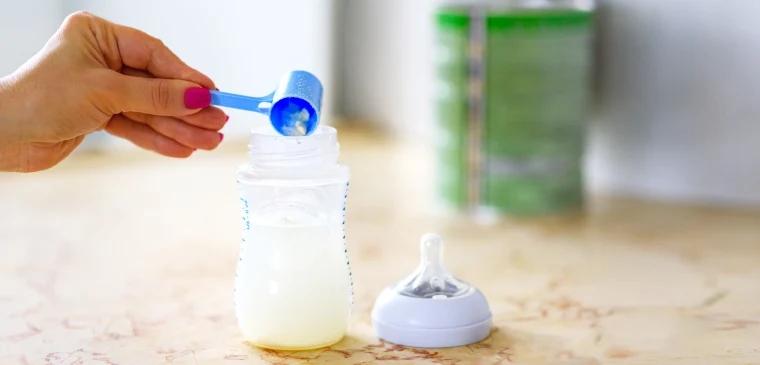Switching baby formulas is a decision parents sometimes face, and 2024 has seen some exciting advancements in the realm of infant nutrition. While a baby’s primary source of nutrition is ideally breast milk, formulas can play a crucial role in ensuring your child gets the essential nutrients they require. As parents, it’s imperative that we prioritize our baby’s health and make informed decisions regarding their nutrition.
Understanding Formula Types
In today’s market, there are several types of baby formulas. The most common is cow’s milk-based formula, which is suitable for most infants. It’s fortified with iron and closely mimics the nutritional composition of breast milk. However, some babies are intolerant or allergic to cow’s milk.
For these infants, soy-based formulas are a viable alternative. They are lactose-free and made from soy protein. Soy formulas are usually recommended for babies with lactose intolerance.
There are also hypoallergenic formulas. These are designed for infants with allergies to both cow’s milk and soy. The proteins in these formulas are broken down into smaller parts, making it easier for babies to digest.
When deciding on the type of formula for your baby, consider their nutritional needs, allergies, and digestive health. Always consult your pediatrician before making any changes.
Signs It’s Time to Switch

Identifying when it’s time to switch formulas can be challenging. Common signs include frequent vomiting, excessive gas, diarrhea, or constipation. If your baby seems constantly unhappy after feeding or develops a rash, it may also indicate an intolerance or allergy to their current formula and you might need a different solution such as The Milky Box.
Regardless of these signs, it’s crucial to consult a pediatrician for guidance. They can offer expert advice tailored to your baby’s needs.
Consult Your Pediatrician
Before changing your baby’s formula, always talk to a pediatrician. They can provide valuable insights into whether a formula change is needed and recommend suitable alternatives. When communicating with your child’s healthcare provider, be honest and detailed about your concerns. Bring a list of symptoms, questions, and the current formula you are using to ensure a productive discussion.
Gradual Transition
When switching formulas, adopting a gradual approach ensures your baby’s comfort and acceptance. Instead of an abrupt change, start by mixing just a quarter of the new formula with three-quarters of the old one. Over several days, slowly increase the amount of the new formula, allowing your baby to adjust to the different taste and composition. This phased approach not only helps your infant get used to the new taste but also significantly reduces the risk of digestive upset, such as gas, bloating, or diarrhea.
Allergy and Sensitivity Considerations

Source: verywellfamily.com
Allergies and sensitivities are common concerns among parents, especially when their baby shows adverse reactions to certain formula ingredients. These reactions might manifest as persistent fussiness, hives, a stuffy or runny nose, or even alterations in stool consistency. In these cases, hypoallergenic or specialized formulas become the go-to options. These formulas are crafted to minimize allergens and are easier for sensitive babies to digest. Nevertheless, before making a switch based on suspected allergies, always consult with a healthcare professional to ensure you’re making the best choice for your child.
Reading Labels
With a plethora of choices in the market, understanding formula labels becomes paramount. While scanning the label, prioritize formulas fortified with iron, DHA, and ARA. These are vital nutrients that play a pivotal role in your baby’s development, ensuring optimum brain and visual growth. On the flip side, it’s wise to steer clear of formulas laden with excessive sugars or any unnecessary additives. Such additives might not only compromise nutritional value but could also lead to undesirable health effects. By being meticulous with labels, you ensure you’re arming your baby with the finest nutrition.
Formula Preparation

Source: today.com
When it comes to baby formula, preparation isn’t just a routine—it’s an art. Adhering to the guidelines on the formula label is non-negotiable. For starters, always use safe and preferably boiled water. This eliminates any harmful pathogens. Then, be diligent about achieving the right powder-to-water ratio to ensure the formula isn’t too dilute or concentrated. Once prepared, store any unused formula in the refrigerator, ensuring its freshness. However, remember to discard any portions left untouched after 24 hours. This rigorous approach guarantees both the safety and nutritional effectiveness of the formula.
Formula Costs and Budgeting
Navigating the formula aisle can be daunting, especially when factoring in expenses. Different types and brands come with varied price tags. To alleviate the financial strain, think about purchasing in bulk, which often translates to savings in the long run. Also, keep an eye out for manufacturer coupons or discounts, which can offer significant relief. However, amidst all the budgeting, the priority should remain on quality. It’s worth investing in a reputable brand that ensures your baby’s well-being and developmental needs are met.
Monitoring Baby’s Response
Post the switch, vigilance is key. It’s crucial to observe your baby’s reaction to the new formula. This means keeping tabs on any behavioral changes, digestion patterns, and their overall health. Are they more irritable? Have their sleeping patterns shifted? Are they experiencing any digestive discomfort? These observations will guide you in understanding if the new formula is a hit or miss, and if any further tweaks in their diet are necessary.
Formula Transition Challenges

Source: milk-drunk.com
The journey of transitioning can be peppered with challenges. Some infants, being creatures of habit, might resist or show aversion to the new taste. Others might grapple with temporary digestive discomforts. During these trying times, patience becomes your best ally. If resistance persists or if you observe prolonged digestive issues, it’s prudent to consult a pediatrician. Their expert guidance can help streamline the transition process.
Formula Brands and Reviews
2024 is bustling with reputable formula brands. Household names like Enfamil, Similac, and Gerber continue to dominate the shelves, trusted by parents globally. But with myriad options, how does one choose? To aid in decision-making, tap into the wealth of information available on parenting forums or websites dedicated to baby product reviews. These platforms are goldmines of real-world insights and experiences from fellow parents, offering a clearer picture of what might work best for your baby.
Conclusion
Switching baby formulas is a significant decision that requires careful consideration. Prioritize your baby’s health, consult with a pediatrician, and stay informed about the latest in infant nutrition. In 2024 and beyond, our babies deserve the best, and it’s our job as parents to provide just that.
